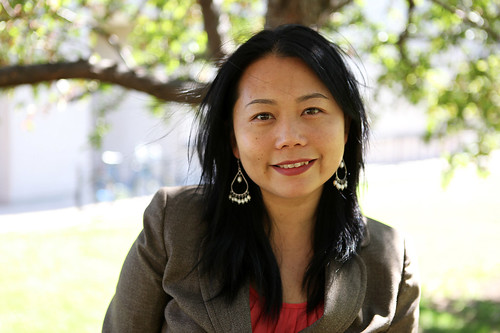
Political science professor recently published “China’s Regulatory State: A Strategy for Globalization.”
Roselyn Hsueh, assistant professor of political science and author of the newly published book “China’s Regulatory State: A New Strategy for Globalization,” provided insight on the future of China’s growing economy and the control of information technology.
During a trip to China in 2002, Hsueh investigated China’s complex world economy.
“In my mind I saw this bridled capitalism,” Hsueh said. “At the same time, you talk to people operating in these different companies, whether it’s foreign private or state owned. They try to explain the world [economy] but always in ambiguous and nebulous ways, so it got me fascinated. I get these contradictory descriptions of the role of the state and…that is why I embarked on this…careful micro [industrial] study what is actually going on in the Chinese economy.”
Hsueh’s investigation involved interviewing stakeholders, managers from foreign companies and local government bureaucracies who discussed policies that impact foreign businesses.
Hsueh would sit down with different company managers and ask them questions about the Chinese government, their policies, rules and regulations and how policies were implemented.
“Often times [the] CEO divides between actual policy and practice,” Hsueh said. “You could have a rule in the book but the way it’s enforced could look very different, so that’s why I wanted to have really in-depth interviews with the companies…I wanted to really understand.”
Hsueh traveled beyond Beijing and Shanghai to the Western Levels to make sure she got the “full picture.”
After conducting her research, Hsueh made an important discovery using strategic-value logic that can explain why the government has increased influence of certain industries, including telecommunication and technology.
“The reason why I say that there is a strategic value logic to explain this model is that what we see [in] the Chinese government [is] …relinquished state control in non-strategic industries but at the same time…intensified state control in the strategic ones,” she said.
Hsueh said that the modernization of communications infrastructure is a contributing factor in assisting China’s economic success.
Christine Khor, a tourism and hospitality major said she has seen the growing appeal of China’s global economy to U.S. business majors.
Khor said her friend chose to take Mandarin to fulfill the language requirement for the business school because he said he felt that China will “dominate the world” in 10 years.
“He really feels that eventually…the Chinese economy is going to be the one that everyone is going to rely on…and that his goal is to potentially find a job in China because of [its] economy,” Khor said.
Khor said that many people she knows share the sentiment of wanting to work in China after graduation.
“That’s just like crazy for me because growing up everyone is like, ‘I want to come to the [U.S.].’ Now everyone’s focus is on China,” she said. “But everyone knows at the same time how competitive it is, too, so everyone is trying their best to put out their résumé.”
However, Hsueh explained that the Chinese government shows some weakness in the development of technology and the micromanagement of telecommunications.
She said the Chinese government is focused on developing indigenous technology, which has not been entirely successful.
China has forced telecommunications companies to implement its telecommunications standards. The industries are required to monitor social media and text messaging. This censoring of communication through mobile technologies is an attempt at preventing a revolution, Hsueh said.
Hsueh said she was curious whether China would be the next Arab Spring.
“That’s what’s going to affect political and social instability in the long run. That’s another unintended consequence of introducing competition but at the same time regulating the strategic industries,” she said. “But what do we know what’s going to happen in the next 20 years? I think for the time being we are not going to see an Arab Spring, that’s not going to happen, but I think the jury is out on what is going to happen in 20-25 years.”
Hsueh said students will get a better understanding of the Chinese business model and global relations from reading her book.
“That’s true for business students, students of politics, journalism students and students everywhere,” Hsueh said. “In order to understand our future and ourselves we need to understand other parts of the world, and since China is this rising economic and political power, what better place to start in understanding the world then to look to China.”
Jennifer Hudes can be reached at jennifer.hudes@temple.edu.


Be the first to comment